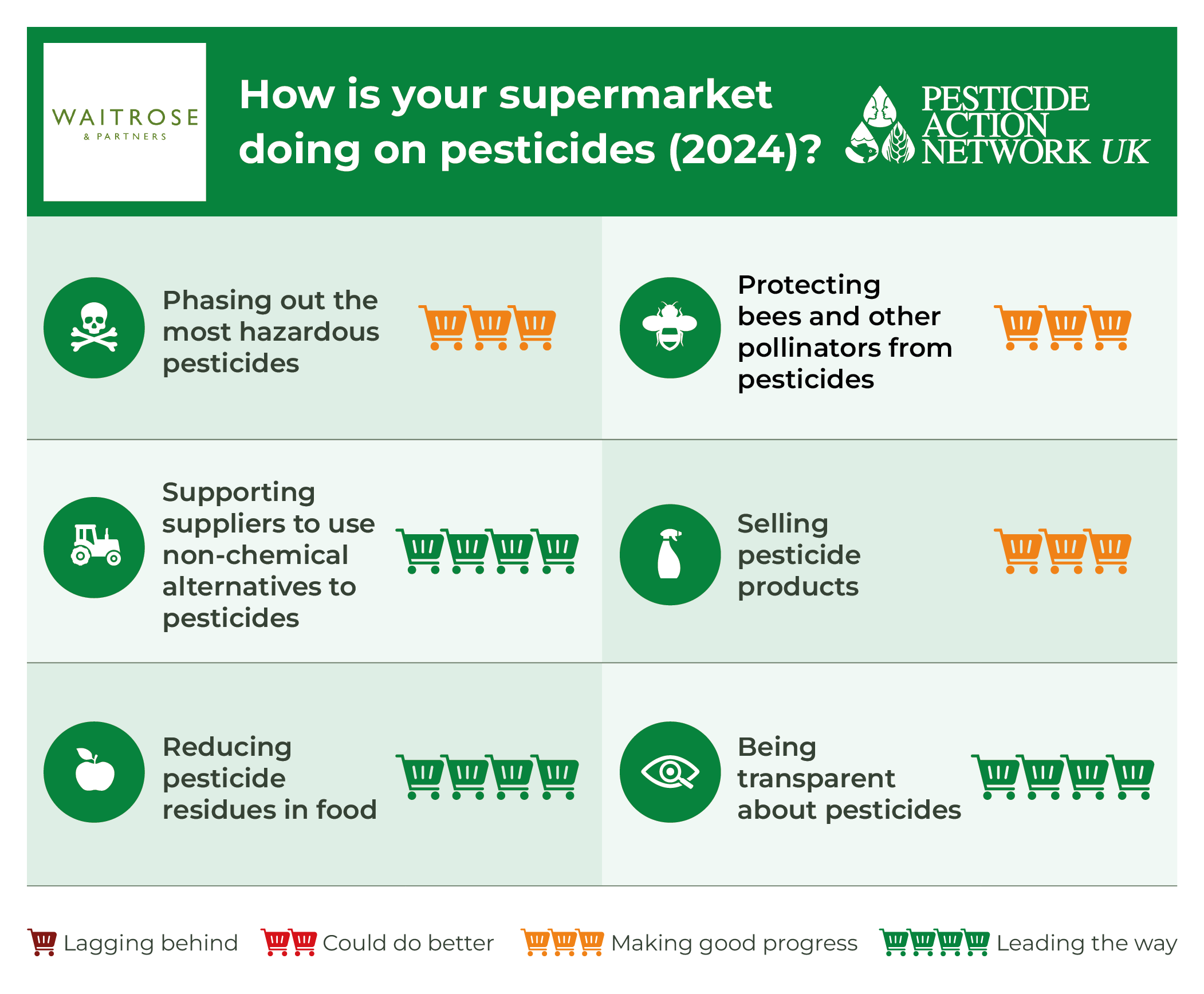Waitrose
Waitrose received an excellent overall score and came joint first in the 2024 supermarket ranking. The company’s position has not changed since the previous ranking in 2021. While there is still more work to do, Waitrose continues to make great progress compared to the majority of other UK supermarkets in terms of protecting the health of consumers, agricultural workers and the environment from pesticides.

What is Waitrose doing well?
Phasing out Highly Hazardous Pesticides
- Waitrose has a strong focus on ending the use of Highly Hazardous Pesticides and is making excellent progress in eliminating the most toxic pesticide from use within its global supply chains. The lists of pesticides which it bans, restricts and monitors are far more robust than most other supermarkets. Since 2022, the company has ended the use of a range of harmful pesticides (including the lethal herbicide paraquat) and added many more to its restricted and monitored lists.
Supporting suppliers to use non-chemical alternatives to pesticides
- The company provides excellent support to its suppliers to help them reduce pesticide use and is doing a huge amount in this area. It supports research and trials into non-chemical alternatives and has a permanent Centre of Excellence which provides practical tools, workshops, online resources and mentoring to help farmers make the shift to regenerative agriculture. In addition to training and guidance, the company provides its UK, EU and international growers with bespoke advice on how to reduce pesticide use and adopt non-chemical alternatives. It also has a pesticide working group as part of its Fresh Produce Forum, which brings together its suppliers from around the world to share best practice and key learnings.
Reducing pesticide residues in food
- Waitrose has expanded its testing programme significantly since the last ranking in 2021 and now tests a wide range of food types for pesticide residues including fruit, vegetables, spices, nuts and wheat products such as bread and pasta. When this testing detects a residue that reaches half of the legal safety limit, or when the residues of more than five different pesticides are found on one food item, an extremely thorough investigation is triggered. This includes working closely with the supplier to understand and tackle the problem, recommending appropriate non-chemical alternatives and sharing any learnings gleaned across the supply chain. The company also supports suppliers to reduce residues in food, including temporarily suspending cosmetic rules concerning how fruit or vegetables should look.
Protecting bees and other pollinators from pesticides
- The company is better than most other UK supermarkets at protecting pollinators from pesticides. It has restricted the use of neonicotinoids (insecticides notorious for driving declines in pollinator populations worldwide) which means that any grower wanting to use these chemicals must justify their request, complete a risk assessment and seek explicit permission to go ahead. Other pesticides that are ‘highly toxic to bees’ also sit on their restricted list, with the use of some newer chemicals being monitored for emerging problems. The company funds research into the impacts of pesticides on pollinators and has a longstanding ‘pollinator action plan’ which encourages growers to take a range of pollinator-friendly actions such as planting flowering field margins and establishing solitary bee hotels.
Selling pesticide products
- Waitrose is one of three UK supermarkets which has stopped selling synthetic pesticide products in its gardening and pet ranges.
Being transparent about pesticides
- Waitrose got full marks for transparency because it publishes its full pesticide policy, the results from its residue testing programme and the lists of which pesticides it has prioritised for phase out.
What are Waitrose’s priority areas for improvement?
Phasing out Highly Hazardous Pesticides
- The company’s lists which ban, restrict or monitor the use of particular pesticides within its global supply chains, only apply to fruit and vegetables. While prepared and frozen fruit and vegetables (including salad and oven chips) are covered, Waitrose should expand its approach to also include other types of food. The company told PAN UK that it is currently working on this. Ultimately, supermarkets should be aiming for their pesticide policy and lists to apply to all own-brand products so that when a pesticide is banned it is not allowed to be used in any of its products.
Protecting farmworkers from pesticides
- When using any chemical, all Waitrose growers are required to conduct a risk assessment which includes worker safety. The company also has better internal, health and safety procedures than most other supermarkets and is the only UK supermarket to involve workers directly in this process. However, Waitrose is not currently systematically monitoring pesticide poisonings throughout its global supply chains which is a major gap. It also does not require those using pesticides that pose a particularly high risk to worker health to adopt additional safety measures. Like all UK supermarkets, Waitrose could therefore be doing more to protect the health of agricultural workers involved in its global supply chains. The company told PAN UK that it has plans in place to increase its efforts in this area and will soon start collecting information on pesticide poisoning incidents.
Protecting bees and other pollinators from pesticides
- Waitrose continues to have many pesticides which are classified as ‘highly toxic to bees’ sitting on its restricted and monitored list, including neonicotinoids (the insecticides notorious for driving declines in bee populations worldwide). Given the global biodiversity crisis, which is impacting pollinators particularly harshly, all supermarkets should be moving towards phasing these chemicals out from use across their global supply chains.
- Pesticides are still sprayed around Waitrose stores and car parks with the aim of controlling weeds. However, the company is currently trialling a wide range of non-chemical alternatives and told PAN UK that it plans to review its position once the trials have been completed. To help biodiversity flourish, the company should go pesticide-free around all its stores as soon as possible.
Selling pesticide products
- Waitrose sells two biocidal products (wasp and insect killers) which contain Highly Hazardous Pesticides, such as cypermethrin. The company told PAN UK that it will look into replacing them with less harmful alternatives as soon as possible.













